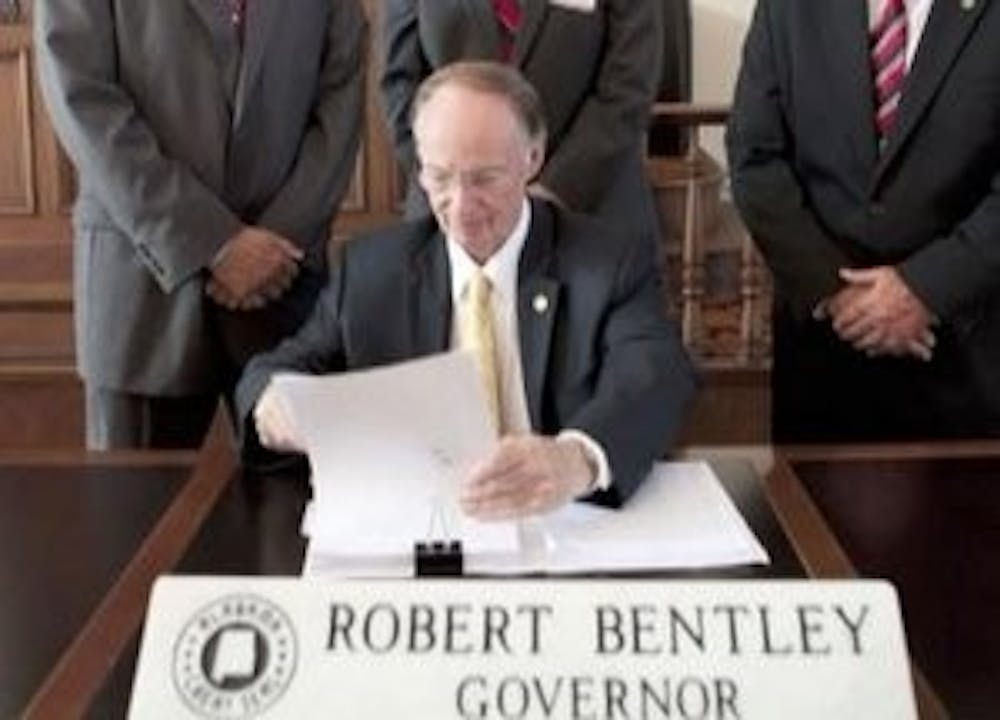The chaos surrounding HB 56, Alabama's latest immigration reform law, is slowly winding down after news of the appeals court's mixed verdict was given Aug. 17.
"We opposed HB 56 when it was debated and voted on, and have been involved in efforts to strike it down, to improve it and repeal because we're concerned about the human consequences of the law," said Jim Carnes, communications director for Alabama Arise, an advocacy organization that overlooks public policies that affect low income Alabamians.
The verdict was a partial victory for both sides. Measures such as the charging of a misdemeanor for not carrying required immigrant documents, prohibiting undocumented immigrants from applying for work, making illegal the harboring of undocumented immigrants and voiding contracts signed with undocumented immigrants were struck down.
The court, however, did not strike down measures prohibiting immigrants from attending universities and the power of law enforcement officers from checking people's immigration status given reasonable cause. Reactions from Alabama public officials have been optimistic.
The law, which constitutional scholar Jonathon Turley described as "Arizona's law on steroids" has been described as one of the most critical and controversial immigration policies by critics such as Alabama Arise and the Hispanic Interest Coalition of America.
According to an article by the Southern Poverty Law Center, the initial ruling created massive hysteria. Complaints from undocumented families included having their water turned off to being denied health care.
On the national level, efforts pursued by the Obama administration are countering the intended effects of Southern immigration policies.
According to Fox News, the Department of Homeland Security is executing an immigration policy that will ease the process of deferred action for an estimated one million illegal immigrants.
The article "Senator accuses Obama Administration of giving safe harbor to some criminal illegals," written by Todd Starnes, says aliens convicted of crimes related to immigration policies, as well as aliens living in the US illegally may be granted deferred action.
Additionally, the new national policy grants immunity to aliens who used fake Social Security in order to find work.
Social Security fraud has become one of the major concerns for Alabama legislators like Senator Jeff Sessions. According to Treasury Department Inspector General, the IRS refunded in total $4.2 billion in 2010, contrasted from the $924 million refunded to illegal aliens by the IRS in 2004.
In some cases, children claimed by aliens lived outside the borders of the U.S.
Alabama public officials maintain that they have done nothing wrong and that the law is constitutionally sound.
"[The law] it's not anti-immigration, it's anti-illegal immigration. The bottom line of the law is that if you live and work in Alabama you should do so legally," said Jeremy King, deputy communications director of the governor's office.
Opposition to the law began almost immediately after Gov. Bentley signed it on June 9, 2011.
The three parties that sought legal action against the law were the U.S. Department of Justice, The Hispanic Interest Coalition of America and several religious organizations.
All three parties attempted to seek preliminary injunction, which if successful would prohibit the state from enforcing provisions of the law.
Specifically, the Justice Department's argument was that the law violated federal law preemption. Preemption is a legal concept that describes a limitation within state governments to pass laws in areas where federal laws dominate.
U.S. Federal District Court Judge Sharon Lovelace Blackburn, ruled partially in the plaintiff's favor. She granted partial injunction on behalf of the plaintiffs and prohibited portions of the law, such as: making it a misdemeanor for an illegal alien to apply or perform work and making it illegal for an individual to conceal, harbor or shield an alien in the U.S.
Other measures the court enjoined, or prohibited, were measures that included prohibiting undocumented immigrants to enroll in universities and community colleges and requiring that all students provide documentation, such as visa and resident statuses, when entering such institutions.
Measures that survived the district court included invalidation of contracts with aliens, the duty of police officers to stop individuals they suspect to be of illegal status, and requiring public schools to determine whether a student has the proper documentation.
"It's time to move forward through what we have...We believe that if you're here in the state there's nothing unjust. It's time to move forward into the enforcement," King said.
Critics of the law are anticipating another offensive to combat the law and its consequences.
"We think it's going to be difficult to enforce that provision [officers checking an individual's immigration status] without racial profiling and we expect that it will be appealed," said Carnes. "As incidents of racial profiling occur there will be grounds for civil rights' challenges and those will go to court."
Do you like this story? The Plainsman doesn't accept money from tuition or student fees, and we don't charge a subscription fee. But you can donate to support The Plainsman.




